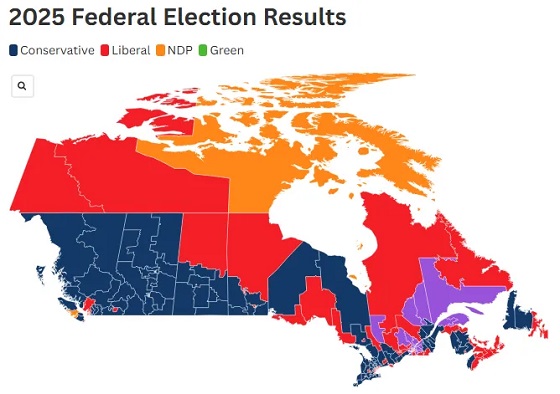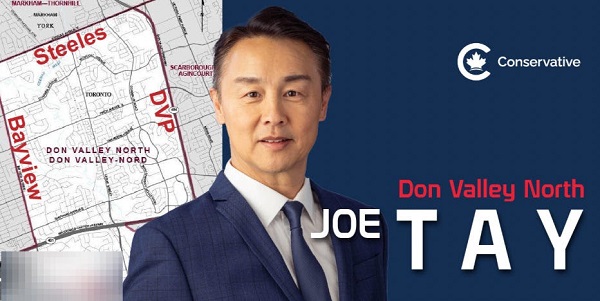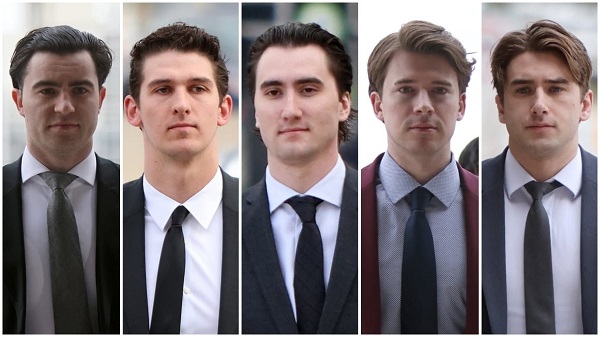2025 Federal Election
China Election Interference – Parties Received Security Briefing Days Ago as SITE Monitors Threats to Conservative Candidate Joe Tay

 Sam Cooper
Sam Cooper
SITE says it is concerned about the Hong Kong bounty on Joe Tay and is monitoring the situation, but confirms intervention in the Chiang case is not within its powers
Canada’s election threat monitoring body has confirmed that national party leaders received a classified security briefing late last week, as public concerns mount over threats tied to transnational repression and a widening controversy involving Liberal MP Paul Chiang’s remarks about Conservative candidate Joe Tay.
The revelation came Monday during a public update by the Security and Intelligence Threats to Elections (SITE) Task Force. Allen Sutherland, a senior Privy Council Office official and SITE leader, confirmed the briefing referenced today by Prime Minister Mark Carney covered high-level threat assessments and involved security-cleared representatives from each political party. While SITE would not confirm whether Chiang’s remarks were specifically addressed, the timing suggests they may have been a factor.
“I can speak to a portion of it,” Sutherland said in response to a question from The Canadian Press. “Last week, political parties received a briefing — a security briefing — on threats at the classified level. These are the cleared party representatives of each of the parties. So that briefing took place late last week.”
A CBC reporter also pressed SITE officials on whether they were concerned by Chiang’s comment suggesting Tay could be delivered to the Chinese Consulate to collect a bounty. “I would say SITE is concerned about the bounty placed by Hong Kong on Mr. Tay,” said Laurie Ann Kempton of SITE. “We are aware of the comments.”
Asked what candidates should do if they face similar threats, Kempton said: “They should contact police of local jurisdiction immediately. They are also able to contact SITE and the RCMP if they have other concerns, and we will look at it from there.”
Joe Tay has stated publicly that he fears for his safety and has contacted the RCMP. Asked if police have reached out to Tay proactively, SITE official Greg O’Hayon said: “I’d have to get back to you specifically on whether the RCMP has reached out to Mr. Tay.” He added: “If candidates feel under threat, either immediate or not, I would encourage them to reach out to their local police as well as the Canadian Security Intelligence Service so that we can have a combined response to real and perceived threats.”
SITE officials confirmed that the bounty placed on Tay — a Canadian citizen and pro-democracy activist wanted by Hong Kong authorities under Beijing’s National Security Law — is being tracked as a live case of transnational repression. Officials described the recirculation of bounty-related content online as a coercive tactic employed by Beijing to chill political participation in diaspora communities.
“Spreading the information about the bounty is precisely how malign foreign states seek to silence, harass and coerce,” one SITE official said.
Tay’s situation has quickly become a flashpoint in the 2025 federal election campaign. The Chiang controversy erupted after reports surfaced late last week, based on Ming Pao reporting, indicating that during a January meeting with Chinese-language journalists, Chiang said of Tay: “If you can take him to the Chinese Consulate General in Toronto, you can get the million-dollar reward.”
Chiang also told the exclusive gathering of Chinese journalists that Tay’s election to Parliament, while under a Beijing-issued arrest warrant, would cause a “great controversy.”
Chiang has since said his comment was made in jest and issued a social media apology. But Tay rejected the gesture in a press release Monday, calling it “unsolicited” and demanding that Liberal leader Mark Carney remove Chiang as a candidate.
“Threats like these are the tradecraft of the Chinese Communist Party,” Tay said. “They are intended to send a chilling signal to the entire community in order to force compliance to Beijing’s political goals. This situation has left me fearing for my safety.”
SITE also issued a broader warning on Monday: Canada is seeing a rise in both physical and digital transnational repression, including online harassment, smear campaigns, AI-generated deepfakes, and attempts to dox critics of authoritarian regimes.
“In 2023, we informed the public about a targeted online information operation… aimed at silencing critics of the Chinese Communist Party,” said the SITE representative from Global Affairs Canada. “Now, we’ve seen new operations using deepfake content, including sexually explicit images, to further that goal.”
Come back to The Bureau for updates on this rapidly evolving story.
The Bureau is a reader-supported publication.
To receive new posts and support my work, consider becoming a free or paid subscriber.
Support a public interest startup.
We break international stories and this requires elite expertise, time and legal costs.
2025 Federal Election
Post election…the chips fell where they fell

From William’s Substack
 William Lacey
William Lacey
I put a lot of personal energy into this election, trying to understand why it was that Canadians so wholeheartedly endorsed Mark Carney as their new leader, despite the fact that it was the same party who caused irreparable economic harm to the economy, and he has a similar philosophical outlook to the core outlook of the party. I truly believe that we have moved to a phase in our electoral process where, until something breaks, left leaning ideology will trump the day (pun intended).
Coming out of this election I have three questions.
1. What of Pierre Poilievre? The question for Conservatives is whether the wolves feed on the carcass of Poilievre (in my opinion the worst enemy of a Conservative is a Conservative) and initiate the hunt for a new leader (if they do, I believe the future should be led by a woman – Melissa Lantsman or possibly Caroline Mulroney), or does Poilievre move to Alberta and run for a “safe” seat to get back into the House of Commons, change his tone, and show people he too can be Prime Ministerial? His concession speech gives clues to this.
2. What of Mark Carney? Maybe (hopefully) Carney will see the light and try to bring the nation together, as there is an obvious east-west split in the country in terms of politics. Time will tell, and minority governments need to be cautious. Will we have a Supply and Confidence 2.0 or will we see olive branches extended?
3. What of the House of Commons? As I have mentioned previously, there has been discussion that the House of Commons may not sit until after the summer break, meaning that the House of Commons really will not have conducted any business in almost a year by the time it reconveens. If indeed “we are in the worst crisis of our lives” as Prime Minister Carney campaigned on, then should we not have the House of Commons sit through the summer? After all, the summer break usually is for politicians to go back to their ridings and connect with their constituents, but if an election campaign doesn’t constitute connecting, what does?
Regardless, as the election is behind us, we now need to see what comes. I will try to be hopeful, but remain cautious. May Canada have better days ahead.
Thanks for reading William’s Substack!
Subscribe for free to receive new posts and support my work.
2025 Federal Election
In Defeat, Joe Tay’s Campaign Becomes a Flashpoint for Suspected Voter Intimidation in Canada

 Sam Cooper
Sam Cooper
Canadian police initiated review of campaign complaint.
In one of the most closely scrutinized races of Canada’s 2025 federal election, Joseph Tay—the Conservative candidate identified by federal authorities as the target of aggressive Chinese election interference operations—was defeated Monday night in Don Valley North by Liberal Maggie Chi, following a campaign marred by threats, suspected intimidation, and digital suppression efforts.
The Bureau has learned that Canadian police last week reviewed complaints alleging that members of Tay’s campaign team were shadowed in an intimidating manner while canvassing in the final days of the race. The status of the incident review remains unclear.
With over 20,000 votes—a 43 percent share compared to 53 percent for Liberal Maggie Chi—Tay nearly doubled the Conservative Party’s 2021 vote total of 12,098 in this riding.
Last Monday, federal intelligence officials disclosed that Tay was the subject of a highly coordinated transnational repression operation tied to the People’s Republic of China. The campaign aimed to discredit his candidacy and suppress Chinese Canadian voters’ access to his messaging through cyber and information operations.
That same day, federal police advised Tay to suspend door-to-door canvassing, according to two sources with direct knowledge, citing safety concerns. Several days later, Tay’s campaign reported to police that a man had been trailing a door-knocking team in a threatening manner in a Don Valley North neighbourhood.
The Bureau is a reader-supported publication.
To receive new posts and support my work, consider becoming a free or paid subscriber.
Following The Bureau’s reporting, the New York Times wrote on Sunday: “Fearing for his safety, Mr. Tay… has waged perhaps the quietest campaign of any candidate competing in the election. The attacks on Mr. Tay have sought to influence the outcome of the race in Don Valley North, a district with a large Chinese diaspora in Toronto, in what is the most vote-rich region in Canada.”
In a twist, in neighbouring Markham–Unionville, Peter Yuen—the Liberal candidate who replaced former MP Paul Chiang, who had made controversial remarks about Tay being turned over to Chinese officials—was defeated by Conservative candidate Michael Ma. According to Elections Canada’s results, Ma secured the riding by about 2,000 votes.
Tay and his campaign team had conducted extensive groundwork in Markham–Unionville earlier this year, where he publicly announced his intention to seek the Conservative nomination in January. However, the party ultimately assigned him on March 24 to Don Valley North—a riding that, according to the 2024 report of the National Security and Intelligence Committee of Parliamentarians (NSICOP), was the site of serious foreign interference by the People’s Republic of China during the 2019 election.
At 2 a.m., Tay posted a message to X thanking supporters: “By God’s grace, though we did not win tonight, we have already won something far greater—the courage to stand, to speak, and to dream together.”
Signaling he may run again, Tay added: “Our journey does not end here. I remain committed to upholding Canadian values—freedom, respect, and community—and will continue to serve and help build a wholesome, principled community in every way I can.”
Last Monday, SITE—Canada’s election-threat monitoring task force—confirmed that Tay was the target of a coordinated online disinformation campaign, warning in briefing materials that “this was not about a single post” but a “deliberate, persistent campaign” designed to distort visibility and suppress legitimate discourse among Chinese-speaking voters.
The tactics bore striking resemblance to interference allegations uncovered by The Bureau during the 2021 federal election, when Conservative MP Bob Saroya was unseated in Markham–Unionville amid allegations that operatives linked to the Chinese government had shadowed Saroya, surveilled his campaign, and sought to intimidate voters. Senior Conservative officials said CSIS provided briefings at the time warning of what they described as “coordinated and alarming” surveillance efforts.
In Tay’s case, official sources confirmed that Chinese-language platforms circulated disinformation framing him as a fugitive, invoking his Hong Kong National Security Law bounty—set at $180,000 CAD—to portray his candidacy as a threat to Canada.
Earlier this month, The Bureau reported that former Liberal MP Paul Chiang—who defeated Conservative incumbent Bob Saroya in 2021—withdrew as a candidate after the RCMP opened a review into remarks he made suggesting that Joe Tay’s election could spark “great controversy” for Canada because of Hong Kong’s national security charges, and that Tay could be handed over to the Chinese consulate to collect a bounty. Chiang later apologized, describing the comments as a poorly judged joke. However, prominent diaspora organizations and human rights groups condemned the remarks as a disturbing example of rhetoric echoing transnational repression.
According to SITE assessments reviewed by The Bureau, coordinated suppression efforts were particularly acute in Don Valley North, where Tay’s online visibility was sharply curtailed across Chinese-language social media ecosystems.
The status of the RCMP’s review into Chiang’s remarks—and a separate complaint to Toronto police alleging that Tay’s campaign staff may have been intimidated while canvassing—remains unclear.
With Mark Carney’s Liberals securing a narrow minority and Canada’s political landscape growing increasingly polarized—against the backdrop of an intensifying cold war between Washington and Beijing—some pundits predict voters could be heading back to the polls sooner than expected. Whether election threat reviewers will now dig deeper into China’s suspected interference in this and other ridings remains an open question.
The Bureau is a reader-supported publication.
To receive new posts and support my work, consider becoming a free or paid subscriber.
Invite your friends and earn rewards
-

 2025 Federal Election1 day ago
2025 Federal Election1 day agoIn Defeat, Joe Tay’s Campaign Becomes a Flashpoint for Suspected Voter Intimidation in Canada
-

 Automotive2 days ago
Automotive2 days agoMajor automakers push congress to block California’s 2035 EV mandate
-

 Mental Health2 days ago
Mental Health2 days agoSuspect who killed 11 in Vancouver festival attack ID’d
-

 COVID-192 days ago
COVID-192 days agoFormer Australian state premier accused of lying about justification for COVID lockdowns
-

 Alberta1 day ago
Alberta1 day agoPremier Danielle Smith responds to election of Liberal government
-

 Autism2 days ago
Autism2 days agoUK plans to test children with gender confusion for autism
-

 Addictions2 days ago
Addictions2 days agoFour new studies show link between heavy cannabis use, serious health risks
-

 Bruce Dowbiggin2 days ago
Bruce Dowbiggin2 days agoMistrial Declared in Junior Hockey Assault Trial. What Now?









